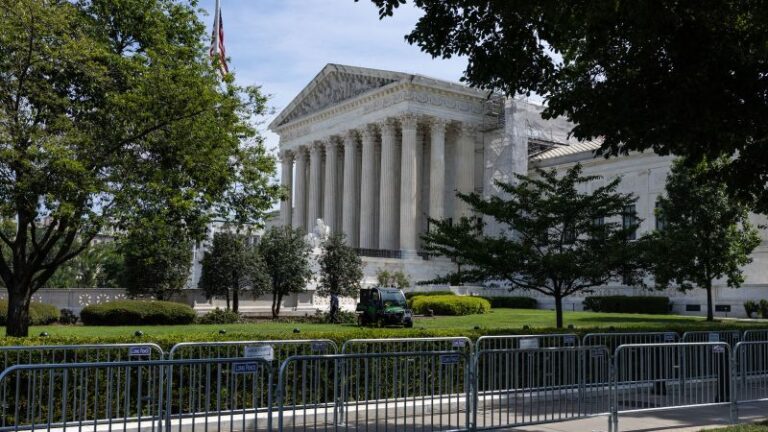CNN
—
The Supreme Court is expected to issue its final ruling of its term Monday morning, settling the question of whether former President Donald Trump can claim immunity from federal election subversion charges.
The nine justices are meeting in court for the last time before the summer recess, one day past an unofficial deadline of the end of June, likely setting up continued legal battles over their final decision.
For now, the most significant issue remaining unresolved is whether Trump is entitled to the blanket immunity he is seeking from special counsel Jack Smith on his election interference charges.
Trump has argued that without immunity a president would be hamstrung while in office, constantly fearful of being questioned by overzealous prosecutors after he leaves the White House, a position that appeared to find some support from the 6-3 conservative Supreme Court during oral arguments in April.
The answer to this question could have significant implications for both Trump and future presidents. During Thursday’s CNN debate, Trump claimed that President Joe Biden “has the potential to be a convicted felon for everything he’s done.” The answer was in response to a question from CNN’s Jake Tapper about whether Trump would seek retaliation against his political opponents. Trump initially responded that “retaliation would be successful,” but then launched into a series of accusations against Biden.
The immunity case is likely to come down to whether President Trump’s post-election actions were “official” — in accordance with the duties of his presidency — or “private” for which immunity is unlikely to be granted.
The court will also decide two cases at the intersection of the First Amendment and social media, focusing on laws enacted in Florida and Texas aimed at preventing major social media companies like Facebook and X from suppressing conservative voices. The state laws prohibit online platforms from removing or downgrading posts that express opinions, including political content.
The Republican governors who signed the law said it was necessary to prevent social media platforms from discriminating against conservatives.
In some ways, the underlying issue is less salient than it was when the lawsuit was first filed — conservatives are less likely to accuse the social media giant of suppressing their views since Elon Musk bought X and changed the company’s content moderation policies — but the lawsuit still raises fundamental First Amendment questions that could have far-reaching implications.
At the heart of both debates is whether curating posts is protected speech (just as news outlets are entitled to First Amendment protections for the design of their front pages and guest lineups) or whether social media platforms are simply delivering third-party posts to their readers in a way that allows the government to more closely regulate them.
The final case to be decided is one in which North Dakota truck stops are challenging the fees banks can charge on debit card transactions, and the decision could have even bigger implications for other government regulations. The question the Supreme Court will hear is whether truck stops can even sue in the first place, given that there is a six-year statute of limitations for challenging government regulations.
It’s a technical issue, but one that could have significant implications: The federal government has warned that if the court sides with the truckstops, it could lead to a flood of similar challenges to government rules.
The decision caps a term in which the Supreme Court has largely avoided fundamental questions on two major abortion issues. It sided with the Biden administration on one gun control case and struck down a federal ban on bump stocks on another. The Supreme Court also narrowed the scope of charges brought by prosecutors against hundreds of people who took part in the Jan. 6, 2021, storming of the U.S. Capitol.
Beyond the rulings, the Supreme Court’s term was also plagued by controversy outside of the bench, including a series of reports that controversial flags, including an upside-down American flag, had been flown on Justice Samuel Alito’s property. An activist who described himself as a religious conservative at a Supreme Court event released secret recordings of Justice Alito, his wife, and Chief Justice John Roberts discussing a variety of politically sensitive topics.
Finally, the Court committed a stunning breach of rules by inadvertently releasing a draft decision in a major abortion case just one day before it was due to issue a formal ruling. In that case, the Court rejected a challenge between the state of Idaho and the Biden Administration over the state’s strict abortion ban, temporarily blocking enforcement of the ban in emergency health circumstances while the litigation continues.

